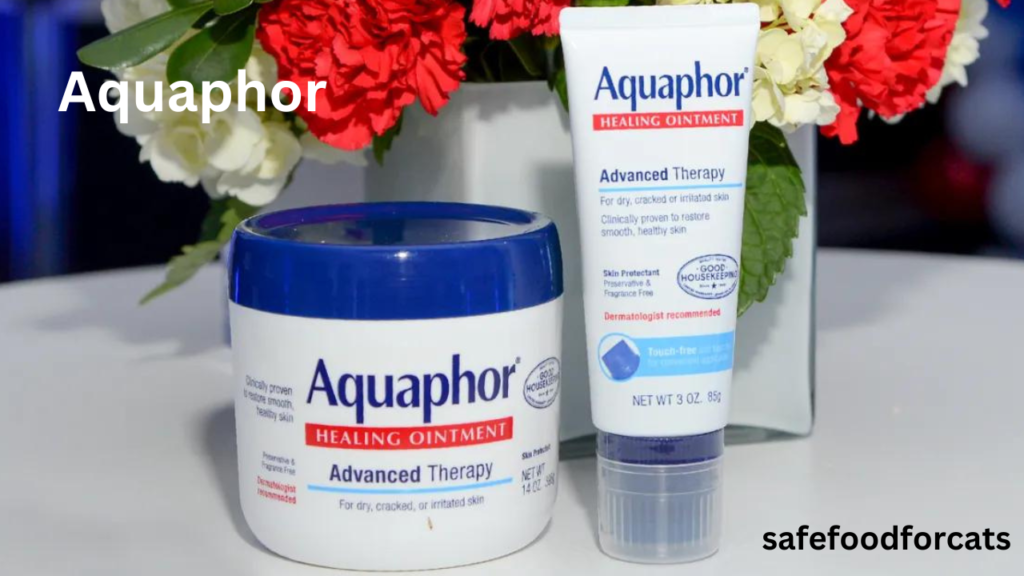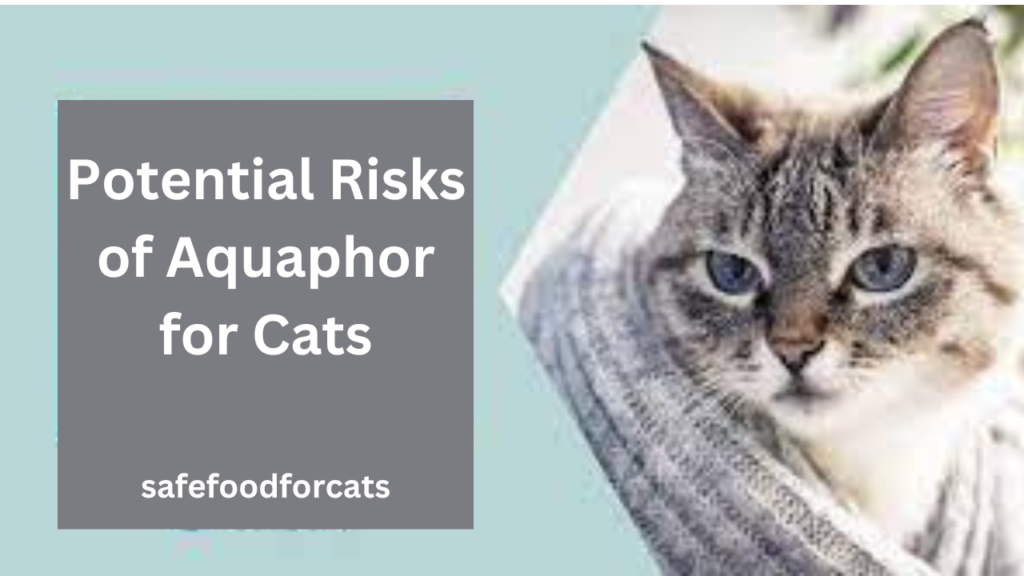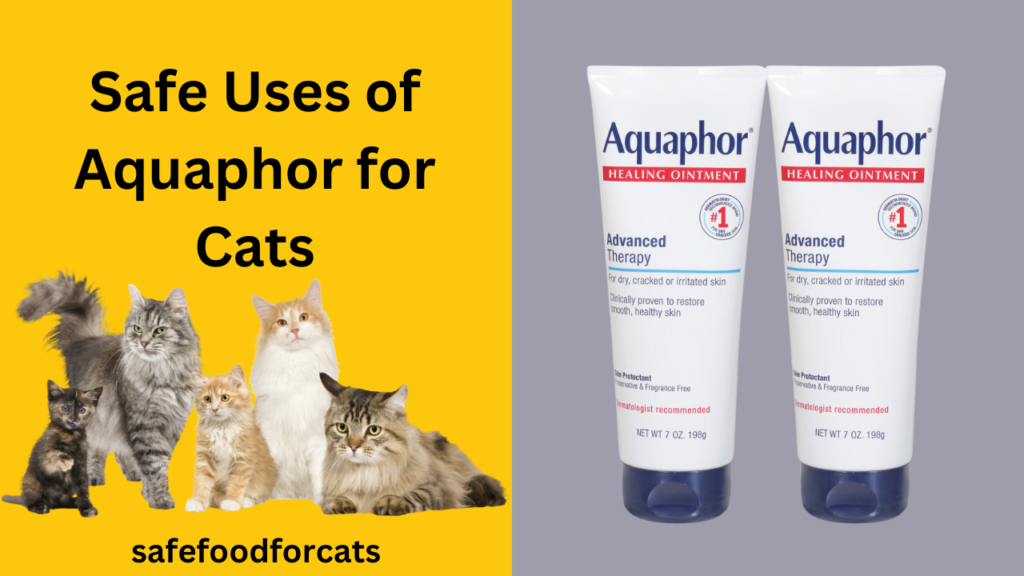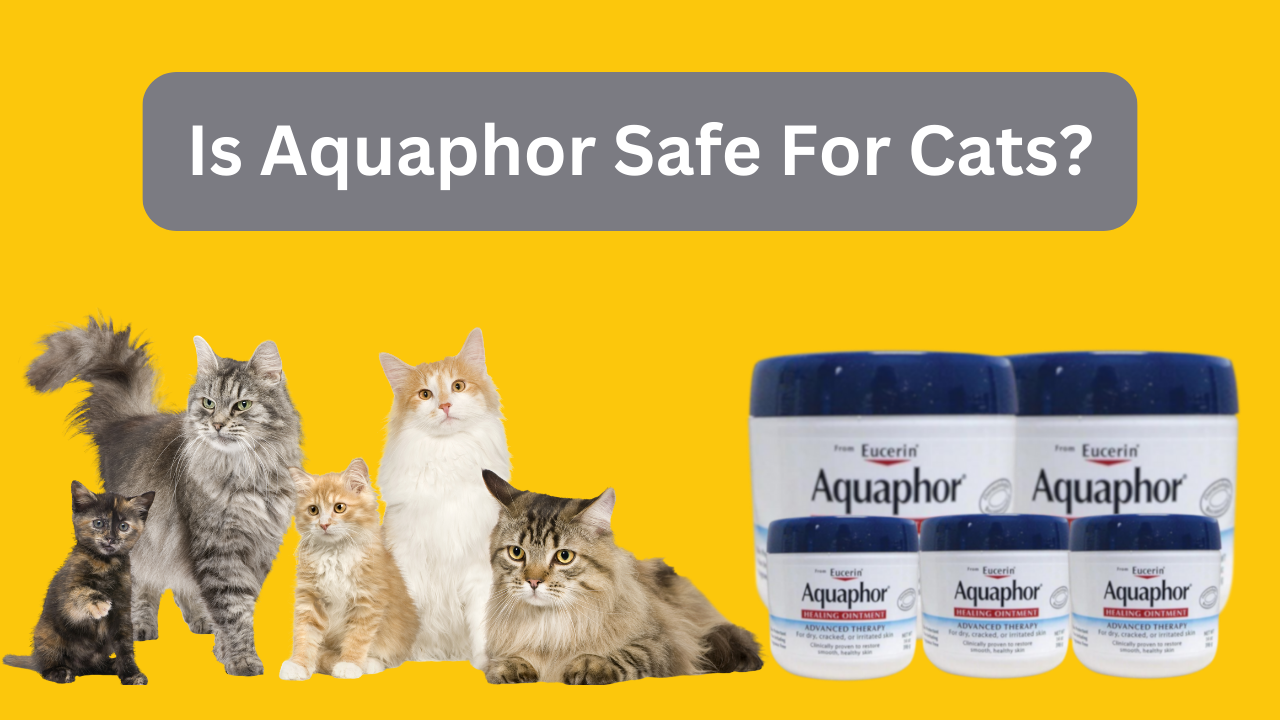If you’re a cat owner, you know how curious and mischievous our feline friends can be. From exploring every nook and cranny to investigating new scents, they always manage to find themselves in unique situations. This brings us to the question: is Aquaphor safe for cats? As a pet parent, it’s essential to ensure the products we use around our beloved kitties won’t harm them. In this article, we’ll take a closer look at Aquaphor and its safety for our furry companions. So, let’s dive in and find out if this popular ointment is feline-friendly or not.
What is Aquaphor
Definition of Aquaphor
Aquaphor is a popular brand of skincare product that is commonly used to moisturize and protect the skin. It is a thick, semi-occlusive ointment that is designed to create a protective barrier on the skin’s surface, helping to lock in moisture and provide relief for dry, chapped, or irritated skin.
Common uses of Aquaphor
Aquaphor is widely used for a variety of skin conditions in humans, including dry skin, eczema, and minor burns. It is known for its hydrating and soothing properties, making it a go-to product for many individuals seeking relief from dryness and irritation. Aquaphor has also gained popularity as a multipurpose product and is often used as a lip balm, for diaper rash in infants, and to help heal tattoos.
Ingredients in Aquaphor
Aquaphor contains a simple yet effective blend of ingredients that work together to provide moisturization and protection for the skin. The main ingredients include petrolatum, mineral oil, ceresin, lanolin alcohol, glycerin, and bisabolol. Petrolatum, the primary ingredient in Aquaphor, forms an occlusive barrier on the skin, preventing moisture loss and protecting the skin from external irritants.

Understanding Cats’ Skin
Importance of healthy skin for cats
Just like humans, cats rely on healthy skin to provide a protective barrier against the external environment. Healthy skin helps to keep out harmful pathogens, regulates body temperature, and prevents dehydration. It plays a crucial role in maintaining a cat’s overall well-being and comfort.
Common skin issues in cats
Cats can experience a range of skin issues, including dryness, itchiness, rashes, and infections. Some common skin conditions in cats include allergies, flea infestations, fungal infections, and dermatitis. These conditions can cause discomfort and distress to our feline friends and may require appropriate treatment and care.
Sensitivity of cats’ skin
Cats have more delicate and sensitive skin compared to humans, making them more prone to skin irritations and allergic reactions. Their skin has a thinner outer layer, making it easier for irritants to penetrate and cause problems. Additionally, cats’ skin has a different pH balance, which means that certain products formulated for humans may not be suitable for use on cats.
Potential Risks of Aquaphor for Cats
Toxicity of specific ingredients in Aquaphor
While Aquaphor is generally considered safe for humans, some of its ingredients may pose a risk to cats. Petrolatum and mineral oil, the main components of Aquaphor, are not toxic to cats in small amounts. However, if a cat ingests a large quantity of Aquaphor, it may lead to digestive upset or other adverse effects.
Allergic reactions in cats
Like any skincare product, Aquaphor can potentially cause allergic reactions in cats. Cats may be sensitive to certain ingredients found in Aquaphor, such as lanolin alcohol or fragrances. Signs of an allergic reaction may include excessive scratching, redness, swelling, or skin lesions. If you notice any of these symptoms after applying Aquaphor to your cat, it is important to discontinue use and consult your veterinarian.
Ingestion risks
Cats are known for their grooming habits, and if they come into contact with Aquaphor on their fur, there is a risk that they may ingest it while grooming themselves. Ingesting a significant amount of Aquaphor can lead to digestive issues, such as diarrhea or vomiting. It is essential to take precautions to prevent cats from licking or ingesting Aquaphor, especially if they have access to areas where the product has been applied.

Safe Uses of Aquaphor for Cats
Veterinary recommendations
Before using Aquaphor or any other skincare product on your cat, it is crucial to consult with your veterinarian. They can provide tailored advice based on your cat’s specific needs and help determine if Aquaphor is a suitable option. Your veterinarian may recommend alternative products that are specifically formulated for feline use or suggest a different approach to address your cat’s skincare concerns.
Soothing minor skin irritations
In some cases, your veterinarian may authorize the use of Aquaphor as a topical treatment for minor skin irritations in cats. This may include dry patches, mild rashes, or small wounds. However, it is important to follow your veterinarian’s instructions carefully and only apply Aquaphor as directed.
Protection against environmental factors
Aquaphor can be used as a protective barrier against certain environmental factors that may irritate the cat’s skin. This can be particularly helpful for outdoor cats or those exposed to extreme weather conditions. Applying a small amount of Aquaphor to paw pads or other vulnerable areas can help protect them from dryness, cracking, or roughness.

Alternatives to Aquaphor for Cats
Cat-friendly moisturizers
If you are looking for alternative moisturizers for your cat’s skin, there are a number of products specifically designed for feline use. These cat-friendly moisturizers are formulated with ingredients that are safe and suitable for cats. Look for products that are fragrance-free, free of potentially harmful chemicals, and have been approved by veterinarians.
Natural remedies for skin issues
For mild skin issues, you may consider trying some natural remedies that could potentially alleviate your cat’s discomfort. Coconut oil, for example, has moisturizing and antibacterial properties that may provide relief for dry or irritated skin. Aloe vera gel, when used in small amounts and with caution, can also be soothing for certain skin conditions. It is always important to consult with your veterinarian before trying any natural remedies on your cat.
Best practices for cat skincare
Maintaining good overall health and hygiene practices can go a long way in promoting healthy skin in cats. Ensure your cat receives a balanced diet that includes essential fatty acids, as these can contribute to healthy skin and coat. Regular grooming, including brushing and bathing as needed, can help remove dirt, dead skin cells, and excess oil, preventing skin issues. Creating a cat-friendly environment that minimizes stress and exposure to potential allergens can also contribute to maintaining healthy skin.
Consulting a Veterinarian
Importance of professional advice
When it comes to your cat’s health and well-being, seeking professional advice from a veterinarian is always the best course of action. They have the knowledge and expertise to guide you in making informed decisions regarding your cat’s skincare needs. Your veterinarian can perform a thorough examination, assess your cat’s specific condition, and recommend appropriate treatments or products.
Discussing individual cat’s needs
Every cat is unique, and what works for one may not work for another. A veterinarian can take into account your cat’s age, breed, health history, and any pre-existing skin conditions when making recommendations. By discussing your cat’s individual needs, you can ensure that any skincare products or treatments are tailored to provide the most effective and safe results.
Addressing concerns and questions
If you have any concerns or questions about using Aquaphor or any other product on your cat, your veterinarian is the best person to turn to. They can address any worries you may have, provide clarity on potential risks, and offer alternative solutions if necessary. It is important to have open and honest communication with your veterinarian to ensure the well-being of your feline companion.
Tips for Applying Aquaphor on Cats
Proper application techniques
When applying Aquaphor on cats, it is crucial to use proper techniques to ensure both effectiveness and safety. Start by cleaning the affected area gently with a mild, cat-friendly cleanser. Pat the area dry, and then apply a thin layer of Aquaphor, making sure to avoid the cat’s mouth, eyes, and other sensitive areas. Gently massage the ointment into the skin until it is absorbed. Avoid excessive rubbing or pressure, as this may cause discomfort.
Frequency and dosage considerations
The frequency and dosage of Aquaphor application will depend on your veterinarian’s recommendation and the specific needs of your cat. It is important to follow the instructions provided by your veterinarian strictly. Applying too much Aquaphor or using it too frequently can lead to adverse effects, so it is best to err on the side of caution and seek professional guidance.
Observing potential side effects
After applying Aquaphor on your cat, it is important to carefully observe for any potential side effects or adverse reactions. Monitor the treated area for any signs of increased redness, swelling, itching, or other skin abnormalities. Additionally, keep an eye on your cat’s behavior and overall well-being. If you notice any concerning symptoms, discontinue use and consult your veterinarian promptly.
Preventing Cat Ingestion of Aquaphor
Awareness of cats’ grooming habits
Cats are meticulous groomers, and they will groom themselves after encountering any substances on their fur or skin. It is crucial to be aware of this instinctual behavior and take steps to prevent them from ingesting Aquaphor. If you notice your cat behaving unusually or excessively grooming an area where Aquaphor has been applied, it is a sign that they may be attempting to lick or consume it.
Keeping Aquaphor out of cats’ reach
To prevent accidental ingestion, it is important to keep Aquaphor and other similar products out of your cat’s reach. Store them in secure cabinets or drawers where your cat cannot access them. Be mindful of where you apply Aquaphor and ensure that areas where your cat frequents are free from the ointment.
Monitoring the cat’s behavior during the application
When applying Aquaphor on your cat, pay close attention to their behavior and body language. If your cat shows signs of discomfort, agitation, or attempts to lick or rub the treated area excessively, it may be an indication that they are experiencing adverse effects. In such cases, stop the application immediately and consult your veterinarian.
Signs of Allergic Reactions in Cats
Common symptoms to watch for
Allergic reactions in cats can manifest in various ways. Some common symptoms to watch for include excessive itching or scratching, redness, swelling, hives, hair loss, or the development of skin lesions. Cats may also exhibit signs of gastrointestinal upset, such as vomiting or diarrhea if they have ingested an allergen.
Seeking immediate veterinary attention
If you suspect your cat is experiencing an allergic reaction, it is crucial to seek immediate veterinary attention. Allergic reactions can escalate rapidly and potentially lead to severe complications. Your veterinarian can assess the situation, provide appropriate treatment, and help determine the cause of the reaction.
Preventing future allergic reactions
If your cat has experienced an allergic reaction to Aquaphor or any other product, it is important to avoid using that product in the future. Keep a record of the allergic reaction and share it with your veterinarian. They can help identify alternative products that are less likely to trigger a similar reaction and provide guidance on how to prevent future allergic episodes.
Other Considerations for Cat Skin Care
Balanced diet and hydration
A well-balanced diet that meets all the nutritional needs of your cat plays a crucial role in maintaining healthy skin. Essential fatty acids, such as omega-3 and omega-6, are particularly important for skin health. Ensure your cat’s diet includes high-quality proteins, proper hydration, and essential nutrients to promote optimal skin condition.
Regular grooming routines
Regular grooming is essential for cat skin care. Brushing your cat’s fur helps remove dirt, dead skin cells, and loose hair, preventing matting and minimizing the risk of skin issues. Additionally, regular grooming allows you to check for any abnormalities, such as bumps, sores, or parasites, and address them promptly.
Creating a cat-friendly environment
Creating a cat-friendly environment can contribute to maintaining healthy skin. Minimize stressors, provide appropriate scratching surfaces to prevent skin injuries, and ensure your cat has access to fresh water, hiding spots, and comfortable resting areas. A stress-free and enriched environment can help promote overall well-being, which reflects on the condition of your cat’s skin.
In conclusion, while Aquaphor is generally safe for human use, it is important to exercise caution when considering its application on cats. Cats have unique skin characteristics and sensitivities that differ from humans, making certain ingredients potentially harmful to them. Always consult with your veterinarian before using any skincare product on your cat, including Aquaphor. They can provide professional guidance, recommend cat-friendly alternatives, and ensure the optimal care and well-being of your feline friend.

